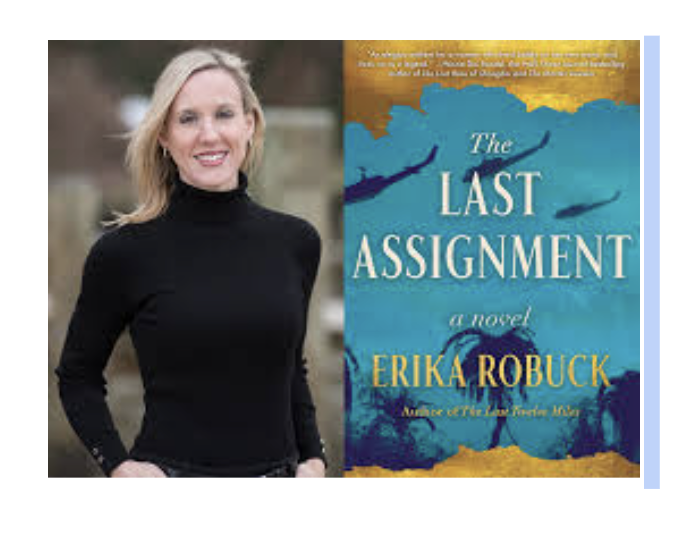Sourcebooks
August 2025
The Last Assignment by Erika Robuck delves into the life of a trailblazing woman photojournalist, Georgette “Dickey” Meyer Chapelle, known for her work as a war correspondent from WWII through the Vietnam War. Through the novel, readers will understand her desire to capture the raw, human side of war, and shows her bond with the troops she was embedded with.
The story shows how she was very supportive of the Marines, who considered her a partner. She trained with them and went to war with them. Most of the book centers on her life during the 1950s and 1960s. It starts with her floundering, having her photo credentials revoked from the military because she disobeyed orders while embedded with the troops at Iwo Jima, the battle fought during WWII. She also had her relationship with her live-in partner crumbling and unable to find a job.
Readers take a journey with her feeling that they are amid a war zone whether in Hungary during the Cold War, Cuba during the revolution of Fidel Castro, and Laos, and South Vietnam. There are potent scenes of her time in a Communist prison after being captured while working in Hungary. Her next assignment takes her to Cuba, where she covers the rebels in the Sierra Maestra and witnesses the revolution of Fidel Castro against Batista’s regime. In 1961 she went to Laos and showed the true horrors of what was happening there. After that she was off to Vietnam and knew that she needed to show her support for the soldiers there.
She wanted to be known as the person who would document the realities of war. She often put herself in danger to make sure that Americans could see what was going on in war zones. Robuck does a wonderful job of showing how Dickey would risk everything to uncover the truth.
Elise Cooper: Do you have any military influences?
Erika Robuck: I have grown up around the military. My father-in-law served in the Army in Vietnam. I have always been interested in that area, ever since I was a teenager. There were a lot of movies that came out around that time. Living in Annapolis I am around the Naval Academy. My grandfather was in the Navy. I was always immersed in the world of the military. A lot of my most recent fictions have been about women involved in the world of military intelligence.
EC: Why write about Georgette “Dickey” Meyer Chapelle?
ER: I was looking through a photograph book of Vietnam where I discovered her pictures and then learned about her personal story. I think of this book as historical fiction or bio fiction where the story is very close to the truth. It has facts but I make up the dialogue. Plus, I sometimes consolidate characters.
EC: Why the setting of Hungary, Cuba, Laos, and Vietnam?
ER: She served in seven conflicts. I chose those that were united in theme. The more research I did, the Cold War became the subject of personal fascination. The time, 1955 to 1965, had the most significant conflicts where she had the deepest relationships and the highest stakes.
EC: Do you think she supported American troops?
ER: Yes, I have this book quote, “American men are dying for the protestors right to free speech and democracy, yet they villainize them.” They are doing it to make sure Americans can retain their freedom. We are spoiled where we are. It is easy to comment when people enjoy their coffee while at their computer.
EC: Why did Dickey become a photojournalist of war zones?
ER: Freedom was an important theme within her philosophy. She was willing to go into very dangerous situations. She wanted to be the eyes and ears of the people so they could understand what was happening. She wanted to see it herself and was always looking for the pictures that showed the collateral of war.
EC: Was she a complex character?
ER: She had a pacifist upbringing but supported the troops and photographed war. My thoughts are that her thirst for adventure was a sort of rebellion as a young person in her pacifist household.
EC: How would you describe her?
ER: She was an optimist, risk taker, courageous, resilient, had self-doubt, gutsy, restless, impulsive, and sometimes she did not think through what she was doing. She was very hopeful.
EC: What role did Tony play in her life?
ER: He taught her about photography. He saw the glamor in her and drew out her feminine side. She came into herself as a woman, an awakening in the early years of their relationship.
EC: Was she affected by being arrested for disobeying the order in Iwo Jima?
ER: It wounded her. Because she did not respect the chain of command she got cut off and had to face the consequences when she lost her military credentials. This was a period of real darkness for her. She learned that if she went into combat, she had to follow the rules.
EC: After she was captured in Eastern Europe, did it make an impact on her?
ER: She was tortured, interrogated, put in solitary confinement, and threated with death daily. She lost a large amount of weight. This fueled her fire to fight for democracy even more after her experience in a Communist prison. This why she wanted to go to regions where they fought Communism.
EC: What do you want readers to get out of the story?
ER: She also lived in New York where she led the glamourous life, between conflicts. People can learn a lot about the human conditions through her. Going into these places with her was like traveling with Forest Gump.
EC: Next book?
ER: I am writing a woman in intelligence military history.
THANK YOU!!

